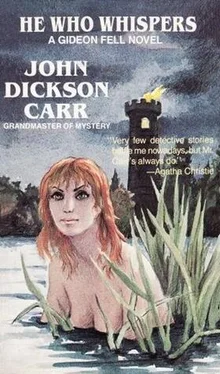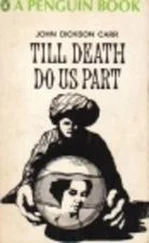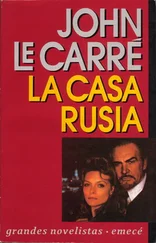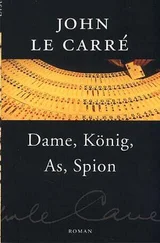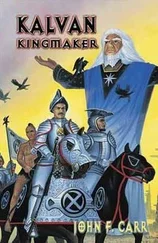Barbara said softly:
“Of all the . . .!”
“Sh-h!”
Miles could not have said why he called for silence; to himself he seemed occupied with the reflection that the display opposite was damned poor advertising and not very funny. He lifted his hand again, and knocked at the door.
“Yes?” called a calm voice, after a very slight pause.
It was Fay's voice. She was all right.
Miles stood motionless for a second or two, watching out of the corner of his eye that blurred shadow moving on the wall, before he turned the knob. The door was not locked. He opened t.
Fay Seton, still in the tweed coat over her dove-grey dress, stood in front of a chest-of-drawers looking round inquiringly. Her expression was placid, not even very interested, until she saw who the newcomer was. Then she gave a smothered cry.
He could see every detail of the room clearly, since the curtains were drawn and the light was burning. A dim bulb hanging over the chest-of-drawers showed him the rather broken-down bedroom furniture, the discoloured wall-paper, the frayed carpet. A heavy tin box, painted black and half as big as a trunk, had been hastily drawn out from under the bed; its lid was not quite shut, and a small padlock hung open from the hasp.
Fay's voice went shrilling up.
“What are you doing here?”
“I followed you! I was told to follow you! You're in danger! There's--”
Miles took two steps into the room.
“I'm afraid you startled me,” said Fay, controlling herself. One hand went under her heart, a gesture he had seen her make before. She gave a little laugh. “ didn't expect--! After all--!” Then, quickly: “Who's that with you?”
“This is Miss Morell. The sister of—well, of Jim Morell. She wants very much to meet you. She . . .”
Then Miles saw what was on top of the chest-of-drawers, and everything in existence seemed to stop.
First he saw an old brief-case of black leather, dried and dusty and cracked, bulging from something inside it; its straps were loosened, and the flap was partly opened. But an old brief-case may belong to anyone. Beside it lay a large, flat packet of banknotes, the topmost one showing the denomination of twenty pounds. The colour of the banknotes might once have been white; they had now a dry, blurred, smeary appearance, and were stained in dry patches of rust-brown.
Fay's pale face was paler yet as she saw the direction of his glance. It seemed very difficult for her to draw breath.
“Yes,” she told him. “Those are bloodstains. Mr. Brooke's blood, you see, got on them when they . . .”
“For the love o God, Fay!”
“I'm not needed here,” Barbara's voice spoke frantically, but not loudly. “I didn't really want to come. But Miles . . .”
“Please do come in,” Fay said in her gentle voice, while the blue eyes kept roving and roving as though she scarcely saw him. “And close the door.”
Yet she was not calm. This apparent case was the effect of sheer despair, or of some emotion akin to it. Miles' head was spinning. He carefully closed the door, to get even a few seconds in which to think. Gently he put his hand on Barbara's shoulder, for Barbara was on the point of running out of the room. He looked round the bedroom, feeling its close air stifle him.
Then he found his voice.
“But you can't be guilty after all!” he said with desperate reasonableness. It seemed vitally important to convince Fay, logically, that she couldn't be guilty. “I tell you, it's impossible! It's . . .Listen!”
“Yes?” said Fay.
Beside the chest-of-drawers there was an old armchair with patches of its back and arms frayed to threads. Fay sank down into it, her shoulders drooping. Though her expression hardly changed, the tears welled out of her eyes and ran unheeded down her cheeks. He had never sen her cry before, and this was worse than anything else.
“We know now,” said Miles, feeling numb, “that you weren't guilty of anything at all. I've heard . . . I've just heard, I tell you! . . . that all those accusations against you were a fake deliberately trumped up by Harry Brooke--”
Fay raised her head quickly.
“So you know that,” she said.
“What's more”--he suddenly realized something else, and stood back and pointed his fingers at her--”you knew it too! You knew they were trumped up by Harry Brooke! You've known it all along!”
It was more than the flash of illumination which sometimes comes from strung-up emotion: it was a fitting-together of facts.
“That's why, last night, you started to laugh in that crazy way when I asked you whether you and Harry Brooke had got married after all. That's why you brought up the subject of anonymous letters against you, though Rigaud had never mentioned any. That's why you talked about Jim Morell, the great friend Harry wrote to every week; though Rigaud never heard of him either.—You've known all along! Haven't you?”
“Yes. I've known all along.”
It was little more than a whisper. The tears still welled out of her eyes, and her lips had begun to shake as well.
“Are you insane, Fay? Have you gone completely off your head? Why didn't you ever speak out and say so?”
“Because . . . oh, God, what difference does it make now?”
“What difference does it make?” Miles swallowed hard, “With this damned thing--!” He strode over to the chest-of-drawers and picked up the packet of bank-notes, feeling repulsion in the touch of them. “There are three more packets in the brief-case, I suppose?”
“Yes,” said Fay. “Three more. I only stole them. I didn't spend them.”
“Come to think of it, what else is in that brief-case? What makes it bulge like that?”
“Don't touch that brief-case! Please!”
“All right. I've got no right to badger you like this. I know that. I'm only doing it because—because it's necessary. But you ask what difference it makes? When for nearly six years the police have been trying to find out what happened to this case and the money inside it?”
The footsteps outside in the passage, which they had been too preoccupied to hear until now, approached the door with a casual air. But the tap on the door, though not loud, had a peremptory sound which could not be disregarded.
It was Miles who spoke; neither of the two women were capable of it.
“Who's there?”
“I'm a police officer,” said the voice outside, with that same combination of the casual and the peremptory. “Mind if I come in?”
Miles' hand, still holding the banknotes, moved as fast as a striking snake when he thrust those notes into his pocket. It was, he thought to himself, just as well. For the person outside did not wait for an invitation.
Framed in the doorway, as he swung the door wide open, stood a tall square-shouldered man in a raincoat and a bowler hat. All of them, perhaps, had been expecting a uniform to Miles at least this was rather more ominous. There was something vaguely familiar about the new-comer's face: the close-cropped moustache turning grey, the square jaw with muscles conspicuous at the corners, the suggestion of the military.
He stood looking from one to the other of the persons in front of him, his hand on the knob; and, in the passage behind him, the light reared and lowered a shadow of he opening and closing of teeth.
Twice those teeth opened and closed before the newcomer cleared his throat.
“Miss Fay Seton?”
Fay rose to her feet, turning out her wrist by way of reply. Superbly graceful, unconscious of the tear-stains on her face; drained of violence, past caring.
“My name is Hadley,” the stranger announced. “Superintendent Hadley. Metropolitan C.I.D.”
And now Miles realized why this face was vaguely familiar. Miles had moved over to the side of Barbara Morell. It was Barbara who spoke.
Читать дальше
